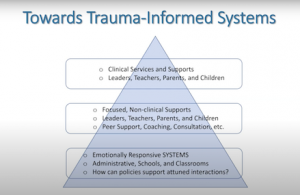As educators continue to experience unique challenges during the pandemic, the issue of mental health support for both adults and the children who they care for is of crucial importance.
On December 4, Bank Street Graduate School of Education hosted its annual Emotionally Responsive Schools Conference for early childhood, elementary, and middle school educators to explore child development and social and emotional learning. This year’s virtual event focused on supporting the mental health of educators and explored techniques for building safe and nurturing school communities, particularly in this time of global health crisis.
“All over the country, teachers, social workers, and school leaders have had to transform many times since the pandemic made its presence known here,” said Lesley Koplow, GSE ’79, Director, Emotionally Responsive Practice, Bank Street College of Education, in a topical keynote presentation titled “The Story of Teacher Mental Health in Our Time,” which addressed how the threat of COVID-19 has impacted educators.
 To begin the presentation, Mark Nagasawa, Director, Straus Center for Young Children & Families, Bank Street College of Education, spoke first about how the pandemic is affecting early childhood educators in New York, citing the results of a survey conducted in May by Bank Street in partnership with the New York Early Childhood Professional Development Institute.
To begin the presentation, Mark Nagasawa, Director, Straus Center for Young Children & Families, Bank Street College of Education, spoke first about how the pandemic is affecting early childhood educators in New York, citing the results of a survey conducted in May by Bank Street in partnership with the New York Early Childhood Professional Development Institute.
Nagasawa noted that participants reported significant impacts on emotional well-being and feelings of isolation, indicating a critical need to strengthen systemic trauma-informed care and mental health services for educators.
“While warm, supportive consistent teacher-child relationships have enormous power to buffer [adversity for] children during trying times, they become less effective when the well-being of teachers is compromised,” said Koplow. “As Mark’s research shows, we often leave teacher mental health to chance during stressful times, and in so doing, risk leaving teachers feeling demoralized and undervalued.”
 To help improve educators’ emotional well-being, Koplow discussed the potential benefits of practicing emotionally responsive techniques that are typically used with children. For example, engaging in symbolic processes that invite self-expression, such as writing, playing music, and drawing, can help adults give a voice to their feelings—both positive and negative—and decrease stress and anxiety. Play is another outlet for adults and children that offers a safe, creative space where one can invent solutions, be playful, and find some relief during a stressful period.
To help improve educators’ emotional well-being, Koplow discussed the potential benefits of practicing emotionally responsive techniques that are typically used with children. For example, engaging in symbolic processes that invite self-expression, such as writing, playing music, and drawing, can help adults give a voice to their feelings—both positive and negative—and decrease stress and anxiety. Play is another outlet for adults and children that offers a safe, creative space where one can invent solutions, be playful, and find some relief during a stressful period.
Following the keynote presentation, participants joined workshops on a variety of topics, including “The Zoom Room as Story Quilt: Connecting our Virtual Windows to Create an Emotionally Responsive Remote Community;” “Nourishing the Black Mind West of Africa: Supporting our Children and Families in our School Communities;” “Using Teddy Bears in Traumatic Times;” and “Advocacy for Emotionally Responsive Practice,” led by Nagasawa.
“When the classroom community and curriculum acknowledges emotional complexity, no one is left out. In especially trying times, it is important that our classrooms can nurture hope, as well as hold the negativity that is likely to be present,” said Koplow.
Learn more about the Emotionally Responsive Schools Conference